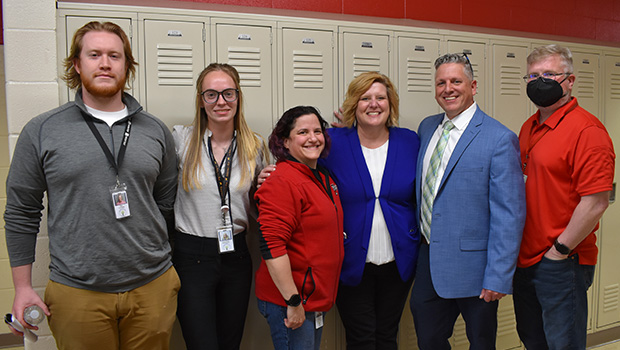As part of Governor Lamont’s workforce readiness initiative, Manchester High School has received a $390,000 state bonding allocation to support the school’s manufacturing program—a move many years in the making that was applauded by teachers, students, and administrators alike.
The program includes 72 hours of Tooling U instruction, 72 hours of paid, on-the-job training, career coaching, mock interviews, advisory board leadership opportunities, and options for earning OSHA manufacturing credentials and dual high school/college credit to an advanced manufacturing certificate or degree.
“Educators are the foundation of workforce readiness, and if there are going to be changes in how we prepare our workforce, it’s vital that we engage educators in those decisions,” said CEA President Kate Dias. “Teachers played an active role in shaping the direction of this program. Ensuring they’re involved not only in executing instructional plans but also, importantly, developing them ensures workforce readiness programs are meaningful, educationally sound, inspiring to students, and defined by real-world relevance.”

CEA’s Kate Dias chats with Connecticut Chief Manufacturing Officer Paul Lavoie.
Clearing a path
Before becoming a tech ed teacher at MHS three years ago, Monica Oquendo spent 13 years as an engineer at Pratt & Whitney, where she saw firsthand the need for more job-ready candidates and the role high schools could play in preparing them.
“We need to bring in the next students to this field, which has openings not only for college-educated engineers but also mechanics and operators who can succeed with the right preparation in high school. The last thing we need for students who don’t wish to pursue a college degree is to leave high school without a plan and become stuck in low-wage jobs. Manufacturing offers so many great options for high school graduates who are well prepared.”
The problem is that tools and machines that high school students get to practice on are often old and rely on outdated technology. Bringing in modern precision manufacturing equipment can be prohibitively expensive.
Chris Prytko, a tech ed teacher at MHS since 1996, says, “This grant allows us to replace equipment that is, in some cases, 40 years old and bring in the technology you’re likely to encounter in a contemporary manufacturing environment. Students who enjoy working with their hands have a real opportunity to do that. And by doing, they realize they can do. They begin to recognize there are tangible options other than college after high school. There is the potential to have a well-paying career without amassing student debt.”

Gov. Ned Lamont announces funding that will improve Manchester High School’s ability to prepare interested students for careers in manufacturing.
Authentic learning
The influx of state bond funding, Oquendo said, will allow MHS to expand its pre-apprenticeship program to include more robust inspections of student work, taking accurate measurements, and reading machines, all of which are critical in real-world manufacturing environments.
“This is huge,” said MHS tech education and communications teacher Eric Larson. “When you’re a teacher looking to inspire kids, you’re looking for those authentic experiences. All teachers in every discipline have that goal, and the expansion of this program makes it possible for us.”
Larson is the son of longtime Congressman John Larson, a pro-education lawmaker who has long worked not only to strengthen Connecticut manufacturing but also manufacturing job creation and worker protections.
Governor Lamont, Lt. Governor Susan Bysiewicz, Representatives Jason Doucette, Jason Rojas, and Jeff Currey, as well as other school, municipal, and state officials visited MHS on Wednesday, May 11, toured the school’s manufacturing lab, and shared with tech ed teachers and students the anticipated benefits of the new bond funding.
Top photo: CEA President Kate Dias (fourth from left) joins Manchester technical education teachers Alec Lombelia, Stephanie Willoughby, Monica Oquendo, Eric Larson, and Chris Prytka in celebrating new bond funding that will support the school’s manufacturing workforce readiness program.







